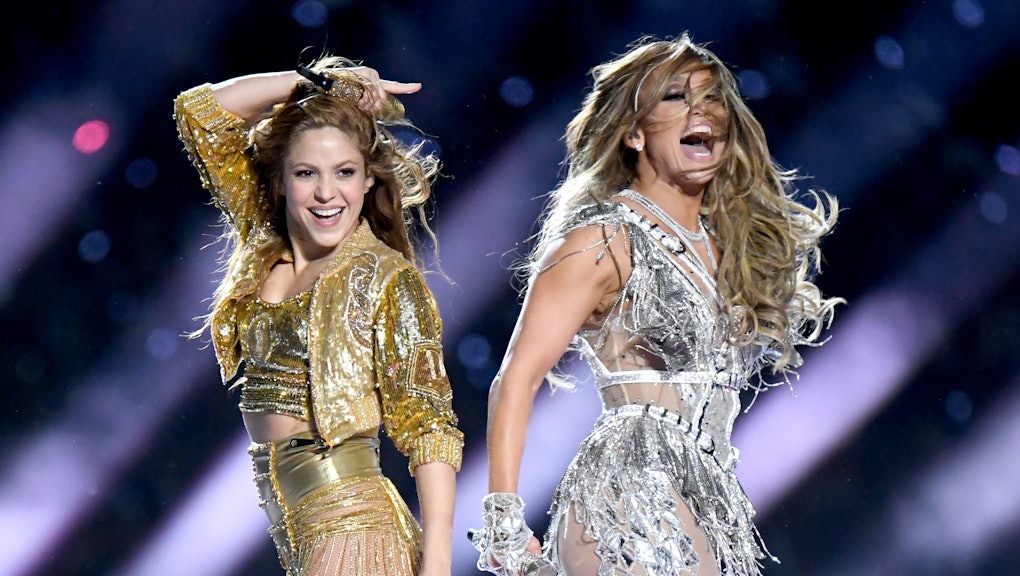#Shakira #JenniferLopez #Halftime #Superbowl
This was a halftime show split in half, almost at war with itself. For the first part, the great whirling Shakira kept low to the ground and close to the body.
The 43-year-old Colombian phenom appeared on a platform but quickly descended to the level of her dancers, where tassels and hips swayed by gravity-bound logic: side to side, forward then back. Shakira’s wide-ranging pop, viewers were reminded, emphasizes folksy, storied, place-specific lineages such as cumbia, reggaeton, and Latin rock. It showcases tangible instruments: brass, violins, a guitar she shredded so theatrically that her orchestra answered with a snatch of Led Zeppelin.
Red—fire and blood and sex—washed across her staging. It was a celebration of flash but not glitz, and of pulsation rather than pounding. You were welcome to shimmy along, if you could keep up.
Then came Jennifer Lopez, the 50-year-old American multimedia celeb of Puerto Rican heritage, appearing with a different vision of entertainment. Clasping a pole, looking down from a tower of human bodies, she started by serving regality: that of Queen Cleopatra’s steely gaze, but also that of King Kong, the New York City titan. When she eventually came down to Earth, it was to lead armies in B-boy black or femme-butch leather, rolling necks and snapping canes. The phalanx threw her on its shoulders (Cheer viewers gasped) or writhed in a pyramid orgy as she executed a stripper’s ballet (Hustlers fans cheered). When the dancers weren’t below her, they were marching to the perfectly staggered steps of their high-heeled leader. This was pop as domination: silver, lasers, EDM. Submit submit submit.
Horizontal versus vertical, athletic versus mechanistic—what were Shakira and J. Lo doing sharing a stage? The obvious answer is that they’re both Latina women, and there’s a way in which that answer seems insufficient, or even insulting. The NFL, facing pop-star boycotts because of its handling of Colin Kaepernick’s anti-racist protests, recently enlisted its onetime critic Jay-Z as talent liaison.
Clearly the league would like to lap up plaudits for booking two Latina women to play the biggest concert in America in the year of Donald Trump’s possible reelection. But it’s inescapable that all other recent Super Bowl halftime headliners have, well, headlined: one artist in the big font, and special guests below.
It’s hard not to wonder what each of these women could have done with a full 15 minutes of control. It’s inevitable that the two artists’ idiosyncratic talents (see: Shakira’s rope-play) will be categorized under one hugely broad label blurring race and culture and genre.
Shakira and J. Lo, however, were out to defy the notion of their work, and the global populace they were said to represent, being reduced in any way. This was an extravaganza that burst at its sparkly harness, and it would have been too much if every part weren’t dazzlingly done. Casually featured were the two Spanish-speaking rappers of the moment and maybe millennium: Bad Bunny (whose shimmering trench oddly fit the outer-space motif in the night’s ads) and J. Balvin (working psychedelic Nintendo-character leisurewear, as is his prerogative).
They updated Cardi B’s Spanish-English classic of 2018, “I Like It,” which itself updated a Spanish-English classic of 1967, “I Like It Like That.” J. Lo’s family also figured (her 11-year-old daughter, Emme, of viral singing fame, performed), as did Shakira’s Lebanese heritage (including immediately memed ululation). The stars shouted “gracias” and “thank you”; they sang a song to Africa; they flashed the flag of Puerto Rico.
And they played politics. Emme and other children sang from glowing structures that resembled cages. On the flip side of the Puerto Rican flag—it was actually a feather coat swaddling J. Lo like paper grass around an Easter Egg—was the flag of the U.S., whose president neglected and belittled its own territory in a moment of crisis.
At the same time, J. Lo’s “Let’s Get Loud” intertwined with Bruce Springsteen’s “Born in the USA,” which was sung by Emme. Solidarity, pride, and the notion that unity complements diversity: These themes were communicated less via slogans than as fundamentals of the show itself, baked into the sound and look and meta-narrative.
By the time the flag coat appeared, Shakira had reentered—behind a drum kit, bringing acoustic warmth to J. Lo’s sci-fi swarm—and certain viewers might have checked their phones. Songs were fragmented to TikTok length; cultural references flew by; the number of fabulously precise micro dances began to approach the number of sequins in the wardrobes.
If your brain indeed got frazzled, do yourself a favor. Pull the performance up on YouTube and be liberal with the pause button: There’s a lot of excellence to dwell on. Close readings, however, will also inform discussions of who exactly was included and excluded (no Afro-Latino performers, for example, took the mic).
Shakira and J. Lo faced a daunting challenge: not only racing through their own distinct discographies but also representing a hugely diverse population at a politically sensitive time and to an easily distracted audience. Yet making the impossible seem real, as they clearly understood, is the essence of spectacle.
By Spencer Kornhaber -theatlantic.com

Comments
Post a Comment